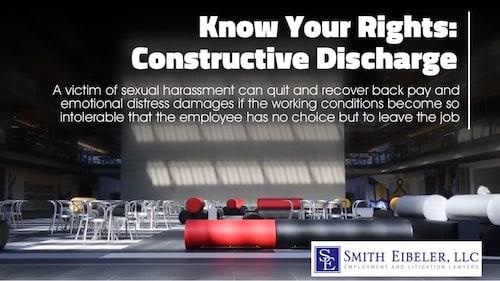OF DISCRIMINATION AND HARASSMENT
Constructive Discharge
Have you been subjected to persistent sexual harassment at work and your employer is doing nothing to address or stop it? Has the sexual harassment or other form of discrimination become so severe that you feel you have no choice but to quit your job? If the answer is yes to any of these questions, you may have an actionable claim for constructive discharge.
A claim of constructive discharge allows an employee to quit his or her job and recover economic and other damages from the employer who allowed the intolerable working conditions to exist in the first place. However, before you decide to quit your job because you believe you have been constructively discharged, it is imperative you consult with an experienced New Jersey employment lawyer to analyze all the facts and circumstances concerning the sexual harassment, discrimination or hostile work environment and the employer’s response to it.

New Jersey Law Against Discrimination prohibits many different forms of discrimination at the workplace. This includes claims of sexual harassment, hostile work environment, discrimination based upon a protected class (i.e., sex, disability, sexual orientation, race, national origin, etc.) and retaliation. Most people seek legal counsel from an employment lawyer after they have been terminated, while others may seek legal counsel while they are still employed. In situations where the employee is still employed, the question often becomes does the employee continue to have to work while being sexually harassed or can he or she quit and seek damages for the loss of their paycheck in the lawsuit. The answer to the question of whether someone has been constructively discharged from their job is very fact sensitive, and there is not always a clear or definite answer.
A “constructive discharge” occurs when an employee resigns from their job because the working conditions become so intolerable that the employee has no choice but to leave the employment. A constructive discharge is legally viewed as if the employee was involuntarily terminated by the employer. The rationale is that if an employer creates or allows the discriminatory working conditions to become intolerable that it causes the victim to quit, the employer is responsible for all damages in the same way as if the employment was involuntarily terminated by the employer.
Proving a claim of constructive discharge can be very difficult. Constructive discharge is a very high standard for a victim of sexual harassment to meet. The sexual harassment and hostile work environment must be so intolerable that a reasonable person in the same situation would feel they have no choice but to quit. This means it is not just what the victim believes is intolerable, but also through an objective standard of someone in the same protected class. In fact, a constructive discharge is a higher standard than proving a claim of a hostile work environment. It is also a higher standard than showing you have good cause to leave work in order to obtain New Jersey unemployment benefits. Specifically, in order to prove a constructive discharge claim, an employee must show that:
- (1) Their employer intentionally created or knowingly permitted intolerable conditions of employment such that a reasonable person would resign from employment; and
- (2) The employee’s resignation was a direct result of those intolerable conditions.
Prior to an employee deciding to quit a job, it is highly recommended that the employee consults with a New Jersey employment lawyer to determine whether the working conditions have become so intolerable that the law would permit the employee to quit and pursue damages. If you have experienced sexual harassment or discrimination at the workplace and do not believe you have any other choice but to quit, please feel free to call one of New Jersey employment lawyers to obtain advice and counsel regarding whether you have a claim for constructive discharge.





